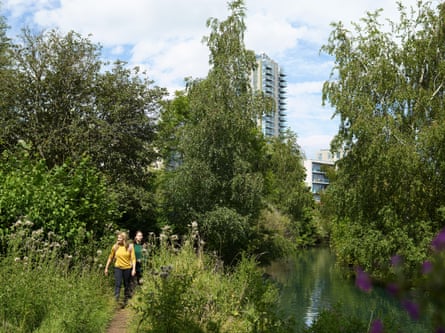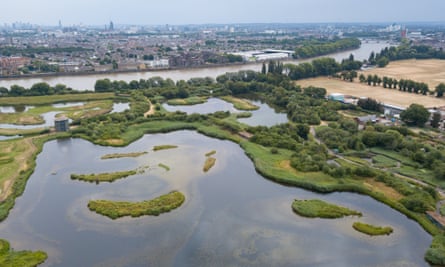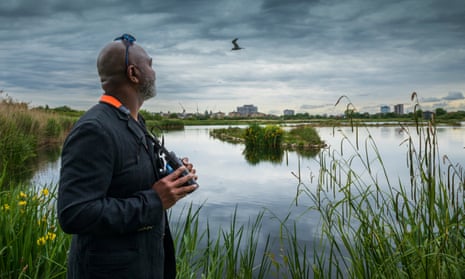Creating wildlife-rich wetlands such as ponds, streams and rain gardens in deprived urban areas could help level up inequalities in wellbeing across the UK, according to a report.
The report collates evidence that access to wetlands improves health and sense of community, saving the NHS huge sums, as well as cooling cities, reducing flooding and curbing air pollution.
People in the poorest urban communities are twice as likely as those in more affluent groups to live in places without good-quality natural spaces, while also having less than a third of the private garden space. Deprived communities are also often at highest risk of poor mental health and the effects of the climate crisis, such as heat stress.

The report from the Wildfowl & Wetland Trust (WWT) proposed new wetlands ranging from large-scale parks supporting whole communities, to restoring streams flowing through neighbourhoods, to street-side rain gardens and back-yard mini-ponds fed by drainpipes.
“Most human settlements grew around a water source and wetlands long used to be an integral part of our great towns and cities,” said Dr James Robinson, the WWT’s director of conservation. “However, new developments have swallowed many of them up and worryingly, there are no UK-wide plans to increase the amount of blue or green nature in urban areas, despite the huge value they provide.”
London’s natural spaces alone are estimated to save the NHS £950m a year in physical and mental health costs. Robinson said creating new urban wetlands across the UK required more support and funding from the public and private sectors: “The opportunities that wetlands offer to enhance and extend our lives are established but are not being grasped.”

Evidence of the benefits that time spent in nature can give to people is growing rapidly. A two-hour “dose” of nature a week significantly boosts health and wellbeing, recent research found, while contact with nature in cities significantly reduces feelings of loneliness. Walks taken by people in UK woodlands were also recently estimated to save £185m a year in mental health costs.
Nature visits are being increasingly offered through social prescribing, where access to activities are provided by doctors alongside traditional medical care. The WWT is working with the Mental Health Foundation (MHF) and the NHS to prescribe time in wetlands in London for people experiencing poor mental health and with limited resources.
“Initiatives such as this can be particularly effective and may sometimes prevent the need for crisis support,” said Dr Ben Plimpton, a project manager at the MHF. Some research suggests social prescribing of wetlands may deliver significantly more wellbeing benefits than arts or sports engagement.
“Increasing structured access to city wetlands could be one of the simplest ways to lift people’s wellbeing in urban areas,” he said.

Llew Watkins, a participant on the London Wetland Centre course who recently lost his job and has bipolar disorder, said: “Having access to the calming effects of the wetlands as well as structured activities with people who are also struggling has been tremendously beneficial to my mental and physical health. I grew up in the countryside but had forgotten how valuable it can be to spend time in nature.”
A coalition of 60 nature, planning, health and equality organisations said in February that councils and property developers should be legally required to provide local access to nature for everyone in the UK. Nearly 3 million people in the UK live more than 10 minutes walk from a public park, garden or playing field.
The WWT report cited studies suggesting wetlands may be more beneficial than natural green spaces alone. Researchers think this may be due to the particularly wide range of stimuli wetland nature provides, from sounds to changing patterns on water.
A study of 16,000 people in 18 countries found that frequently visiting natural water features decreased mental distress, while another showed just 10 minutes spent in urban wetlands can be enough to improve a stressed person’s mood. The WWT said restoring streams and rivers also provided opportunities for walks in towns and cities.
The author David Lindo, known as the Urban Birder, said: “I grew up in London and the River Brent was a lifeline for me as a child. It sparked my lifelong love of birds and boosted my mental wellbeing. Everyone should have access to that. Wetlands could offer national and local government a win-win situation helping them reach their levelling up, climate change, nature and health targets all at the same time.”
